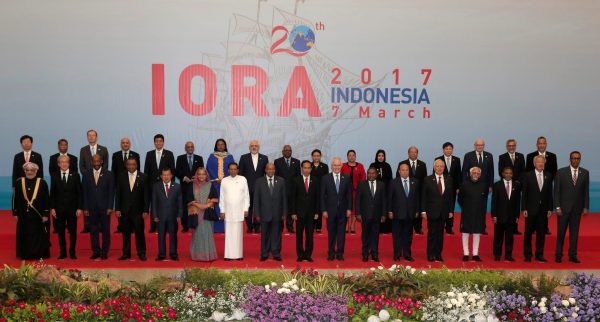Australia and its partners need to find new ways to build effective regional institutions that moderate competition, facilitate cooperation, and provide a collective voice for the region.
The maritime realm is particularly demanding of regional cooperation. The oceans have no physical boundaries, and security challenges at sea often have a tendency to feed into each other. A boat used for illegal fishing can just as easily be used to smuggle arms, drugs or people. The vast size of the Indian Ocean also demands a cooperative response to threats.
What might appear to be an isolated challenge can have cascading consequences if not properly addressed. One example is the consequences of the plundering of fishing grounds off the coast of Somalia by illegal fishers after the collapse of the Somali state some 25 years ago. The destruction of fish stocks was a significant factor in local fishers turning to piracy.
The international response to piracy involved the deployment of naval vessels from around the world. This in turn led to the militarisation of the waters around the Horn of Africa, including the construction of naval bases by several external powers. This series of events shows the potential strategic consequences for the region of failing to take prompt action to address so-called ‘non-traditional’ threats.
The plethora of regional institutions in the Asia Pacific has been an important element in the security of East Asia for several decades by facilitating sustained engagement across many dimensions and stakeholders.
But building multilateral institutions and norms is much more difficult in the IOR where there are fewer traditions of regional engagement. The vast distances across the ocean, its diversity and the limited resources of most states inhibit sustained engagement. As a result, the IOR lacks the supporting institutions that can help create consensus on security-related issues.
For some years, Australia and others have made considerable efforts to help build Indian Ocean institutions that can address shared challenges and make the region more resilient. But results so far have been mixed.
The Indian Ocean Rim Association (IORA) is the only pan-regional multilateral political grouping, although it doesn’t include all Indian Ocean states. But IORA is plagued by limited interest from its members, a lack of resources and limited outcomes that adversely affects its credibility. When Australia was chair of the grouping in 2015–16, it put considerable effort into giving the group greater focus and achieving concrete outcomes, including placing maritime security on its agenda. It has recently established a Maritime Safety and Security Working Group that can help craft pan-regional arrangements to improve oceans governance.
But IORA remains subject to considerable challenges that hamper its effectiveness as a vehicle for regional engagement. Few members are willing or able to commit substantial financial or diplomatic resources to the organisation.
IORA is increasingly attracting interest from extra-regional players that want to build their regional influence. The grouping has or will likely receive cash funding from China, a German political foundation and France. This increased interest benefits IORA, although there is also the possibility that some extra-regional powers may seek to manipulate the grouping for their own ends.
The other pan-regional grouping in the IOR is the Indian Ocean Naval Symposium (IONS) which provides a valuable forum for networking and dialogue among the region’s navies. Its working groups promote dialogue on humanitarian assistance and disaster relief, maritime security and information sharing and interoperability. It is also encouraging its members to sign up to a Code for Unplanned Encounters at Sea (CUES) that may help reduce the risk of accidental conflicts between naval vessels.
IONS is valuable in helping to build cooperation among regional navies, but it is also limited by its nature. It can’t address political problems and its members do not include extra-regional navies — such as the United States and China — that are active in the Indian Ocean.
There are no silver bullets. Australia needs to continue to work with these groupings to incrementally build their effectiveness. But there are also some important gaps in Australia’s regional engagement.
One such gap is the lack of cooperation among IOR coast guards, which are often on the frontline of maritime law enforcement. There is currently no forum to facilitate IOR coast guards working more effectively together on a regional or subregional basis. For example, a forum for coast guard organisations in the eastern Indian Ocean could significantly improve Australia’s ability to work collectively to address the smuggling of people and drugs and illegal fishing.
Australia should also consider working more closely with the Indian Ocean Commission (IOC), a grouping that provides a collective voice to many Indian Ocean island states. Just as Australia uses its membership of the Pacific Islands Forum to plug into local concerns and build resilience among Pacific islands, Australia should consider whether the IOC might provide a way to better plug into the Indian Ocean.
The strategic environment is deteriorating right across the Indo-Pacific, including in the Indian Ocean. It is always a struggle to prioritise limited resources. This means that Australia needs to place even more emphasis on finding innovative and cost-effective ways to help build regional institutions and resilience.
David Brewster is a Senior Research Fellow at the National Security College, The Australian National University.

